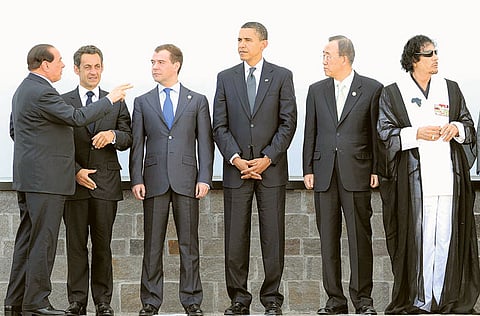France's Libyan dilemma
Its military involvement could easily backfire, as success in Ivory Coast is fragile and one is unsure of the consequences if war with Gaddafi dragged on

The French made use of the special Anglo-American relationship to get US President Barack Obama to put his name to a newspaper article, alongside UK Prime Minister David Cameron and French President Nicolas Sarkozy. The article, published simultaneously in leading American, British and French newspapers, seems to suggest a change in the aim of the military mission in Libya — from imposition of the UN-mandated no-fly zone to regime change. The aim was to cement the division starting to show in the Nato mission as the Germans and Turks oppose the military intervention altogether, while outside powers like China, India and Russia strongly oppose any move towards regime change.
As the UN resolution allows ‘all necessary' means to protect civilians from bombardment by Libyan leader Muammar Gaddafi's forces, the three leaders stated that to leave Gaddafi in power would be an ‘unconscionable betrayal' of Libyans. Bringing Obama on board — even in an article — might give Sarkozy a boost he needs after what now looks like a purely French venture that has lost steam.
Yet, there is no clear commitment that the Americans are ready to give more military support to the alliance on Libya. Since they handed over leadership to Nato on March 31, Libyan rebels have crumbled and Gaddafi's forces have taken the initiative. At the latest Nato meeting in Berlin, which coincided with the publication of the article, other members shunned France's call to commit more military power. US knows from the painful lessons of Vietnam that you can't win a war with airpower alone - however superior your technology. Nobody is willing to send ground troops to Libya, which will be seen as an outright invasion, regardless of any humanitarian or moral cover.
The dilemma of military intervention in Libya is purely French, and the British just joined because the French needed an ally to lobby the Americans and give the impression of an alliance. Sarkozy thinks that America is now weak and it's time France made up for what it lost in Iraq. Jacques Chirac didn't join in the invasion of Iraq not for moral reasons or principles but because he realised the profits will mainly go to the Anglo-American alliance — he was not content with leftovers.
Redefining sovereignty
From the very beginning, arrogant Sarkozy was keen to lead a military operation in Libya to guarantee a profit — a major stake in Libya after Gaddafi. France has ground troops in its former colony Ivory Coast, so it managed to depose Laurent Gbagbo and instal Alassane Ouattara to keep control of the world's biggest cocoa producer.
Even before the ‘war on terror' was used as a pretext for military intervention, violating sovereignty of independent states, the French ex-communist Bernard Kouchner was one of the leading architects of the so-called humanitarian interventionism and called for the redefinition of sovereignty. He even managed to convince former UN secretary-general Kofi Annan to adopt the idea, but it didn't gather support. In a show of hypocrisy, France did nothing to stop the Rwandan genocide in 1994, where 800,000 people were massacred. Rwanda has not got oil or cocoa .
When the popular uprising erupted against Gaddafi's 42-year-old dictatorship on February 17, it was similar to that in Tunisia, Egypt and Yemen: peaceful protests faced by violent oppression from the regime. A bloody crackdown by the Gaddafi regime led to the rebels taking up arms, with some army units defecting. It gave Gaddafi what he sought — a bloody civil war. This meant that no solution in Libya can be reached peacefully - it must be by force. So far no force is effective without full American involvement. Washington is not willing to go into another war, let alone for the French to reap the fruits.
With involvement in six wars — Mali, Afghanistan, Burkina Faso, Somalia, Libya and Ivory Coast — Sarkozy may not bolster his chances of winning a re-election next year. It could easily backfire, as the success in Ivory Coast is fragile and if Libya dragged on, who knows what the consequences could be.
Dr Ayman Mustafa is a London-based Arab writer.
Sign up for the Daily Briefing
Get the latest news and updates straight to your inbox


